Among U.S. adults ages 50 and older who never had children, majorities say achieving certain things in life – such as having a fulfilling life, or a successful career – don’t have much to do with whether someone has children. At the same time, many say not having children has made some aspects of life easier for them.
General impact of not having children
Majorities of adults ages 50 and older who don’t have children say a person’s ability to do each of the following doesn’t have much to do with having kids:
- Have a fulfilling life (66%)
- Have a successful job or career (64%)
- Have an active social life (56%)
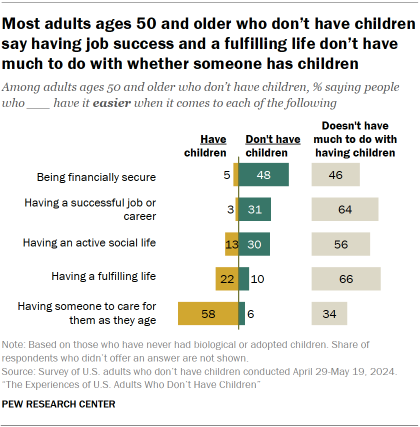
And about three-in-ten say people who don’t have children have it easier when it comes to having a successful job or career (31%) and having an active social life (30%). Much smaller shares say people who do have children have it easier in these areas.
A sizable share of adults 50 and older who don’t have children (48%) say people who don’t have kids have it easier when it comes to being financially secure. Still, a similar share (46%) say this doesn’t have much to do with whether someone has children.
When it comes to having a fulfilling life, 22% say people who do have children have it easier, while 10% say this is easier for people who don’t have children.
The one area where a majority of older adults without children see a clear advantage for parents is in having someone to care for them as they age. About six-in-ten (58%) say people who do have children have it easier in this regard.
Personal impact of not having children
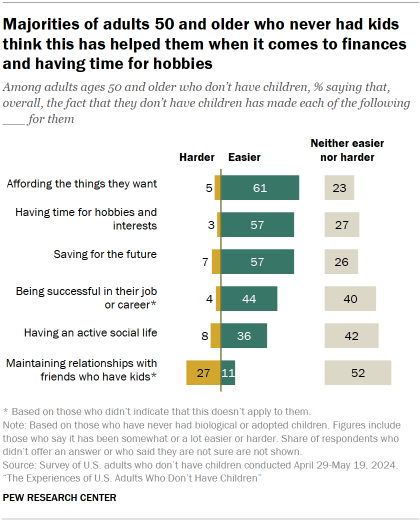
When asked how not having kids has impacted certain aspects of their own lives, majorities of those ages 50 and older say it’s made each of the following easier:
- Affording the things they want (61%)
- Having time for hobbies and interests (57%)
- Saving for the future (57%)
Smaller but substantial shares say not having children has made it easier for them to be successful in their job or career (44% among those who don’t indicate this doesn’t apply to them) and to have an active social life (36%).
About a quarter (27%) say not having children has made it harder for them to maintain relationships with friends who have kids (among those who don’t indicate this doesn’t apply to them). About half (52%) say not having children hasn’t made this easier or harder.
Differences by gender
Half of women ages 50 and older who don’t have children say this has made it easier for them to be successful in their job or career, compared with 39% of their male counterparts (among those who don’t indicate this doesn’t apply to them). In turn, men are more likely to say not having children hasn’t made this easier or harder.
Women are also more likely than men to say not having children has made it easier for them to save for the future (60% vs. 54%).
In contrast, women are more likely than men to say not having children has made it harder for them to maintain relationships with friends who have kids (30% vs. 24% among those who don’t indicate this doesn’t apply to them). Still, roughly half in each group say not having children hasn’t made this easier or harder.
Experiences in the workplace
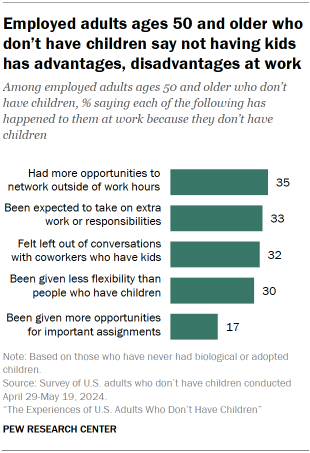
Some employed adults ages 50 and older without kids say this affects their work life in both positive and negative ways.
For example, 35% say they’ve had more opportunities to network outside of work hours because they don’t have kids. But a third say they’ve been expected to take on extra work or responsibilities. And about three-in-ten say they’ve been given less flexibility than people who have children (30%) and have felt left out of conversations with coworkers who have kids (32%).
A smaller share (17%) say they’ve been given more opportunities for important assignments because they don’t have children.
Majorities say they haven’t had these experiences in the workplace due to their not having children.
Differences by gender
Employed women ages 50 and older who don’t have kids are more likely than their male counterparts to say each of the following has happened to them at work because they don’t have children:
- Been given less flexibility at work than people who have children (38% vs. 26%)
- Felt left out of conversations with coworkers who have children (38% vs. 28%)
There are no differences by gender on the other items.
Differences by age
Among employed older adults without children, those in their 50s tend to see more of an impact at work than those ages 60 and older. About four-in-ten of those in their 50s say each of the following has happened to them because they don’t have children:
- Been expected to take on extra work or responsibilities (40% vs. 24% of those ages 60 and older)
- Been given less flexibility than people who have children (38% vs. 21%)
Worries about the future
Shares ranging from 19% to 35% among adults ages 50 and older who don’t have children say they worry about each of the following extremely or very often:
- Having enough money as they age (35%)
- Having someone who will provide care for them as they age (26%)
- Being lonely as they age (19%)
Majorities say they worry about these things at least sometimes.
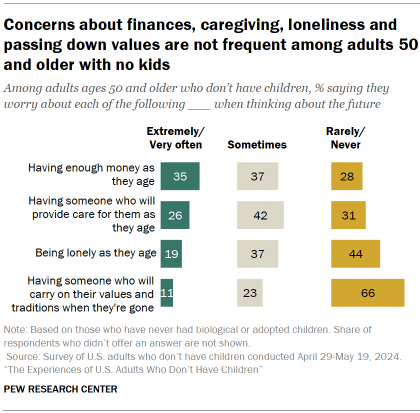
A far smaller share (11%) say they frequently worry about having someone who will carry on their values and traditions when they’re gone. About a third (34%) say they worry about this at least sometimes.
In a separate survey, 46% of parents ages 50 and older said they frequently worry about having enough money as they age. Smaller shares said the same about having someone who will provide care for them as they age (20%), having someone who will carry on their values and traditions (17%), and being lonely as they age (15%).1
Differences by gender
About a third (34%) of women ages 50 and older who don’t have children say they frequently worry about having someone who will provide care for them as they age. By comparison, 20% of their male counterparts say the same.
There are no gender differences when it comes to worries about having enough money, being lonely, or having someone who will carry on values or traditions.
Differences by age
Financial concerns are more common among adults without children in their 50s and 60s than among those ages 70 and older. About four-in-ten of those ages 50 to 59 (42%) and 60 to 69 (38%) say they frequently worry about having enough money as they age. About a quarter of those 70 and older (24%) say the same.
Pros and cons of not having children, according to younger adults who say they’re unlikely to have kids
We asked some of these same questions of adults younger than 50 who don’t have kids and say they’re not too or not at all likely to have them in the future.
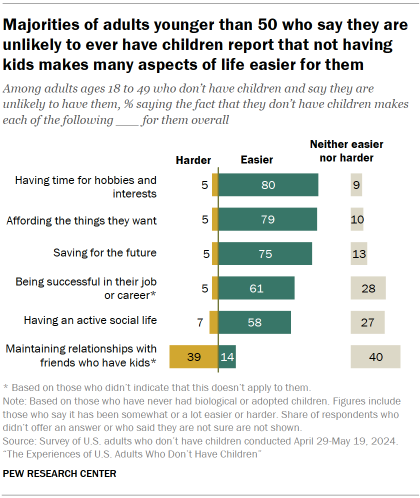
Majorities in this group say the fact that they don’t have children makes almost all aspects of life we asked about easier for them, with three-quarters or more saying it makes it easier for them to:
- Have time for hobbies and interests (80%)
- Afford the things they want (79%)
- Save for the future (75%)
About six-in-ten say not having children makes it easier for them to be successful in their job or career (61% among those who don’t indicate this doesn’t apply to them) and have an active social life (58%).
In turn, a sizable share of these adults (39%) say not having kids has made it harder for them to maintain relationships with their friends who have children (among those who don’t indicate this doesn’t apply to them). A similar share (40%) says not having kids hasn’t made this easier or harder.
We also asked adults under 50 who don’t have children and say they’re unlikely to have them about the general impact of not having kids. About half or more of these adults say people without kids have it easier when it comes to:
- Being financially secure (66%)
- Having an active social life (55%)
- Having a successful job or career (53%)
Like older adults without kids, most adults in this younger group (71%) say having a fulfilling life doesn’t have much do to whether someone has children.
When it comes to their experiences in the workplace, employed adults under 50 who say they’re unlikely to have children also report a mix of positives and negatives related to their not having kids.
- 45% say they’ve had more opportunities to network outside of work hours.
- 39% say they’ve been given less flexibility than people who have children.
- 35% say they’ve been expected to take on extra work or responsibilities.
- 28% say they have felt left out of conversations with coworkers who have kids.
- 19% say they have been given more opportunities for important assignments.




